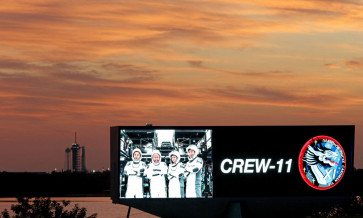Popular Reads
Top Results
Can't find what you're looking for?
View all search resultsPopular Reads
Top Results
Can't find what you're looking for?
View all search resultsKali Gendong river of trash
River of trash: A worker walks on the Gendong River, which is clogged by garbage in Pluit, North Jakarta, on Thursday
Change text size
Gift Premium Articles
to Anyone
River of trash: A worker walks on the Gendong River, which is clogged by garbage in Pluit, North Jakarta, on Thursday.(JP/Seto Wardhana)
The Kali Gendong river in Penjaringan, North Jakarta, used to flow from Jl. Inspeksi to Jl. Muara Baru Pompa, providing water to thousands of residents.
However, as time has gone by and the neighborhoods along the riverbanks have become more densely populated, the 1.5-kilometer river has turned into a bed of trash.
Trash has piled up on the river so much so that the water quality is now very dirty.
What was once a source of clean water for surrounding residents has turned into a nightmare, with the residents becoming restless whenever heavy rain hits the neighborhood.
“I am afraid when rain falls. I can see the garbage rising while the rain fills the river,” said Nur Hayati, a 30-year-old food seller who lives on the river.
Last month, hundreds of residents were evicted from their houses as they were inundated by flood water from the Gendong river.
Nur lowered her head as she showed her floor, which is a set of wooden planks laid haphazardly above the river.
From holes between the boards, she usually observes the height of the water, as well as the trash.
“Do not ask me about the smell,” Nur said, laughing. “Maybe I have adjusted to the smell so now I am not bothered by it anymore.”
Although living on the river, Nur said she and her family never threw their garbage into the river.
“I often see random people throwing trash in the river. They throw not only plastic bags but also carts [full of garbage],” she said, adding that the waste she saw included food.
The waste clogging the river ranges from organic waste to daily accessories, like a wallet.
As Nur does not throw her household’s waste into the river, she relies on a trash collector hired by the community unit (RT) 17 where she lives.
Separately, RT 17 chief Hasnawi Tinggi echoed Nur, saying that he collects monthly funds from residents to pay the trash collector, who regularly collects their garbage.
Therefore, it was unlikely that his residents threw their trash into the river, he claimed.
“However, I have to admit that by all means, some residents might throw garbage into the river,” said Tinggi.
He further said that he has caught people throwing trash into the river, but those people did not belong to the neighborhood.
“I have seen many people getting rid of their garbage in the river while riding bicycles,” he said.
Besides relying on waste collectors, the neighborhood also relies on the city’s workers, particularly Public Facility Maintenance Agency (PPSU) workers, popularly known as the orange troops because of their signature orange uniform.
Since last year, the orange troops have been cleaning the river, but whenever they are gone, the waste returns.
Therefore, the presence of the orange-uniformed officers has become a quick fix, with people still throwing their waste into the river and the residents around the river blaming each other for the problem.
Environment and Forestry Ministry waste management director Sudirman said that the Jakarta administration needed more sustainable programs to ensure the city’s cleanliness, aside from deploying more and more officers to clean the trash.
“Contract workers or orange troops are a good idea, but they only clear piles of existing garbage. They have yet to empower people to manage their own trash properly,” he said on Saturday.
He, however, applauded the city officials for cleaning the river on Saturday.
“Although Kali Gendong is small, it is important to ensure the stability of its surroundings both in wet and dry season,” he said.
Two months ago, the North Jakarta water unit actually tried to clean the river, said Jakarta’s Living Environment Agency deputy head Ali Maulana.
However, the officers were threatened by local residents, making them hesitant to intervene in the area.
“A number of people in the area were once evicted for a road project. Now, they don’t like the administration,” he said. “But, we will still put our best efforts forward to clean the river, by all means.”
Despite the threat, on Thursday, around 40 officers from the water unit of North Jakarta were deployed to the neighborhood to clean the river.
The unit’s deputy supervisor, Yonathan Ramli, said that despite the large number of officers, they needed at least a month to clean the river.
“A month is needed to clean the river areas due to lack of access,” he said.
Given that the areas are densely populated, the officers cannot bring along the unit’s cleaning machines, he explained.
Hence, all the work must be done manually so it will take at least a month to finish, not to mention that the cleaning might not be thorough, he added.
According to Ali, Kali Gedong is included in the ongoing river normalization project, which is handled by Jakarta’s Water Source Agency.










